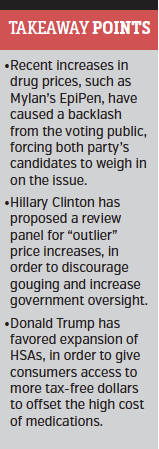Presidential Plans to Fix Drug Pricing: Would Either Work?
 Recent controversy related to drug price gouging has pushed the issue onto the political stage in the midst of the 2016 Presidential election. Each candidate has taken a stance against allowing drug companies to unnecessarily raise prices to unreasonable amounts. However, both candidates have proposed entirely different solutions to the problem.
Recent controversy related to drug price gouging has pushed the issue onto the political stage in the midst of the 2016 Presidential election. Each candidate has taken a stance against allowing drug companies to unnecessarily raise prices to unreasonable amounts. However, both candidates have proposed entirely different solutions to the problem.
Drug pricing also seems to be a topic of concern for the public, meaning the next president faces a mandate from voters to do something about the price of prescription drugs. In Kaiser’s August 2016 Health Tracking Poll, nearly two-thirds of registered Democratic voters and just about half of registered Republicans said this issue should be a top priority for whomever prevails.
The question is, will it be? Health care has not been a major topic on the campaign trail thus far, yet with the recent focus on Mylan’s EpiPen pricing strategy, layered on top of questionable moves by Turing Pharmaceuticals and Valeant Pharmaceuticals International, both candidates are being forced to take a stance against the pharmaceutical industry.
In order to gauge which plans are substantive and which are just political pandering, we reached out to two members of the First Report Managed Care’s Advisory Board to analyze the latest developments, and predict what might happen after the next president is sworn into office.
Varied Urgency
“I think if Clinton prevails, reforming health care will be a higher priority than if Trump wins,” Norm Smith, president of Viewpoint Consulting, Inc, which surveys managed markets decision-makers for the pharmaceutical industry, said in an interview. “Health care is way down on the Trump agenda—he has not shown any type of desire to improve the system.”
In fact, it is Trump’s lack of detail on health that leads many to believe that, if elected, he will hitch his wagon to House Speaker Paul Ryan’s (R-WI), already established, “A Better Way” plan. This plan, often referred as the “repeal and replace” model for fixing issues with the Affordable Care Act (ACA), includes significant cuts to corporate tax rates and cuts for higher earning individual tax payers,
After looking at both Mrs Clinton’s drug plan—including provisions added recently—and the House Republicans’ proposals, Mr Smith teased out two specific items that he believes the public would latch on to. Specifically, if Mrs Clinton prevails, he thinks that her proposal to deal with drug price increases that are categorized as “outliers” could gain traction fast. On the Republican side, after a Trump win, expanding health savings accounts (HSAs) would likely get attention.
Tackling “Outlier” Pricing
For long-standing treatments, Mrs Clinton’s proposal would “establish dedicated consumer oversight [to] determine an unjustified, outlier price increase.” So-called outliers would be determined based on the drug’s price increase trajectory, production costs, and relative value to patients, according to the plan.
Republicans generally denounce increased government regulation, but “it’s going to be very hard to argue the other side,” Mr Smith said. He noted that because it will save money for the everyday consumer, Mrs Clinton’s proposal “is going to be something that a lot of American consumers will agree with.”
However, he added that certain stipulations will have to be made to exclude from such outlier review “drugs that offer a new delivery system, or are made to be more bioavailable.” To illustrate this concern, Mr Smith cited testosterone to treat hypogonadism.
“There are different delivery systems for those drugs,” he said. “It is the same basic molecule, but it has been adjusted to allow for delivery through the skin or orally.” In his view, “you can’t say the prices of those products are unjustified,” since new innovations made them different and presumably better.
Mrs Clinton’s proposal will also allow the government to review drug price policy for small and rare disease states, explained Smith. Under this process drugs like Turing Pharmaceutical’s daraprim, which it increased in price by 4000% in 2015, would be subjected to such oversight. Valeant’s double-digit increases last year would also likely be scrutinized.
When asked if Mylan should fall under this same scrutiny, Mr Smith said he believes this situation is more complex because after mandated rebates and other concessions, the company actually receives about $275 for each EpiPen two-pack. He noted that this is much less than the $600 list price. However, the EpiPen’s relatively cheap production costs would likely get the government’s attention under Mrs Clinton’s plan, even if $275 is the gross profit.

Oversight Is Reasonable—But Keep It Simple
No matter what the number, Barney Spivack, MD, national medical director of Medicare case & condition management at OptumHealth, agreed that some type of government oversight is reasonable, given that the government offers pharmaceutical companies patent protection and research dollars to develop drugs.
Mr Smith said the key to Clinton’s plan gaining traction is to keep it simple. “If she sticks to just outlier price increases, support will follow. It’s a ‘do-something’ issue, and it’s easy to explain.”
However, he added that it remains to be seen if Clinton will stop there. Her proposal calls generally for “penalties for unjustified price increases to hold drug companies accountable and fund expanded access.”
Mr Smith wondered how a Clinton White House would go about pulling off something so broadly defined. He is also worried about the added layers of bureaucracy required to implement such a complex plan. For that reason, he said a narrow focus on the exceptions is warranted, not to mention it is less unwieldy, and more likely to gain bipartisan support.
Still, Dr Spivack said he believes even a broad focus might gain traction. “I don’t view this as red tape, but as consumer protection. The markets have worked only for the benefit of selected corporate leaders, and greater regulation appears necessary given recent events.”
Is Conservative Reform Realistic?
As for the Republican plan, Dr Spivack said he does not see anything that would have an immediate impact, and observes very little that he would consider new or innovative. It “repackages older ideas but adds little [in the form of] meaningful fixes.”
Dr Spivack stated that Mr Ryan and Mr Trump’s call to loosen regulatory barriers by reducing drug approval standards “seems somewhat dangerous, especially because FDA has [already] expedited the process for drug approval.”
Others echoed that sentiment. In a recent issue of the newsletter Health Plan Week, John Gorman of Gorman Health Group, which advises health plans, said that the Republican proposal is more of the same ideas that “these guys have been kicking around since the 1990s; expanding HSAs, block granting Medicaid, the sale of insurance across state lines, and making individual insurance tax deductible.”
Mr Gorman went so far as to suggest—and Mr Smith agreed—that Republican’s are in a quandary because “the ACA is the ultimate Republican, market-based solution and until recently they have wanted nothing to do with improving upon it.”
The Merits of HSA Expansion
Of all the Republican proposals, expanding HSAs is, in Mr Smith’s view, an easy-to-understand concept that he thinks could move along quickly under a Trump presidency. Expanding these accounts would give consumers more dollars to offset out-of-pocket costs, which could quell public outrage over the rising costs of prescription medications.
“HSAs would not require a large outlay of dollars, and would be easy to administer,” Mr Smith said. “Plus, it appeals to the middle class. People like it and it makes sense.”
Compare that with the Republicans’ other proposals, which are a bit more complicated and will take time to implement, and you can start to see why Mr Smith believes simpler is better. For instance, he said “once you start touting that you want to give insurance companies the ability to sell across state lines, you’re dealing with an incredibly complex issue. That is just not going to happen, at least not for a long time. That’s an issue that would be difficult for me to explain even if we had all day.”
However, HSAs and outlier drug price increases are easy to explain solutions to a very complex problem, said Mr Smith, which hopefully make both ideas more substance than talk.













